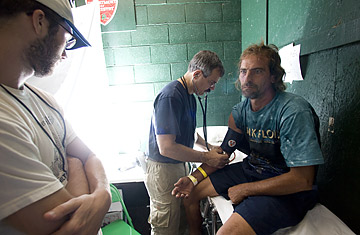
A man receives medical attention from physician Gerald Donovan at a Remote Area Medical clinic at the Wise County Fairground in Virginia
Until the nation's governors staged a public revolt last weekend, few people were paying attention to one of the most far-reaching proposals being considered as part of overhauling the health-care system: a dramatic expansion and redefinition of the Medicaid program. Redefining who is eligible for Medicaid would be one of the major means by which lawmakers hope to achieve universal health coverage — which is one of the reasons that governors, whose budgets are already straining under the program's growing costs, are so wary of the idea. "It depends on what's being proposed," says Pennsylvania's Ed Rendell, a Democrat. "These could essentially be unfunded mandates, and would be enormously destructive to state budgets."
The issue came to a boil as the National Governors Association (NGA) met in Biloxi, Miss. At a luncheon with Health and Human Services Secretary Kathleen Sebelius — who until April had been governor of Kansas — her former colleagues vented their anger at the idea of being handed the bill for yet another Washington initiative. Tennessee's Democratic governor, Phil Bredesen, told the New York Times that he regarded the proposed expansion of Medicaid as "the mother of all unfunded mandates" and warned, "Medicaid is a poor vehicle for expanding coverage."
The proposal could hardly come at a worse time for governors. The recession has drained state coffers of tax receipts, even as public need for state safety-net services is growing. According to the Center for Budget and Policy Priorities, at least 48 states are facing shortfalls totaling $166 billion — 24% of their total budgets. Rendell, the outgoing chairman of the NGA, was unable to attend the Biloxi meeting because he had to stay in Pennsylvania and struggle with the legislature to find a way to plug a $3.2 billion fiscal hole.
Nor, it seems, could the governors' rebellion have come at a worse time for President Obama's health-care-reform effort, which is being hit from every side by growing doubts. Douglas Elmendorf, head of the Congressional Budget Office, has testified that the legislation thus far has too little cost containment. Senators of both parties are trying to put the brakes on the President's drive to have bills passed by the House and Senate by the August recess. Republicans are calling it a dangerous "experiment." And even the Mayo Clinic — often cited by Obama as the model of what an efficient, high-quality health-care system should look like — is cautioning on its blog that legislation under consideration in the House "misses the opportunity to help create higher quality, more affordable health care for patients. In fact, it will do the opposite."
Medicaid has become the latest sticking-point issue in health reform because of the daunting challenge of how to cover those most likely to find themselves without health coverage. Low-income adults — those who earn under 200% of poverty, or $33,200 for a family of four — account for about half the uninsured in this country. Under the current rules, many of them are not eligible for Medicaid, which was established alongside Social Security in 1965 to cover low-income children, their parents, the poor elderly, the disabled and those in need of nursing-home care.
What Congress is now considering is whether to make income alone the determinant of Medicaid coverage. Under the health-reform bill now being considered by the House, all non-elderly people earning at or below 133% of poverty — about $14,400 for an individual and $29,300 for a family of four — would be eligible. The House bill would have the Federal Government pick up the entire cost for those newly covered under Medicaid — $438 billion over 10 years. But a draft proposal by the Senate Finance Committee would have the feds paying the additional cost for only five years, after which the states would have to pick up their typical share of existing Medicaid costs, which averages over 40%.
The Congressional Budget Office predicts that the House proposal would add 11 million to the Medicaid rolls, accounting for about a third of the estimated 40 million uninsured Americans who would gain health insurance under the proposal. But there are real questions as to whether the program could handle the strain of that many new clients. Already, it is difficult in some areas to find health-care providers who are willing to accept Medicaid patients. Governors warn that unless they increase the amount that Medicaid reimburses doctors and hospitals — and, with it, the cost of the program — the supply of providers will not come close to meeting the demand for medical services.
The argument in favor of expanding Medicaid is largely one of efficiency. The existing program "is designed to meet the needs of low-income individuals and those with complex health needs and has an existing delivery, financing and administrative structure," says the nonpartisan Kaiser Family Foundation. "Medicaid coverage for low-income adults could help establish a strong floor of coverage for the low-income population, upon which additional expansion efforts could build." And in some ways, it would be easier for the states to administer an income-based program, rather than one in which they have to keep track of whether recipients fit into a set of multiple categories.
For all the governors' differences, says Rendell, "we would all like to see some federal policy where everyone in the country has access to health care." It's a noble goal. The real question, however, is who should have to pick up the tab.
